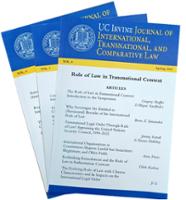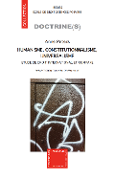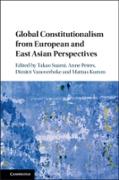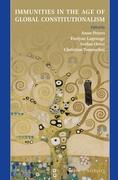Sie befinden sich hier: Forschung Forschung nach Rechtsgebieten Völkerrecht Global Constitutionalism and Global Challenges
Global constitutionalism is under challenge. The argument has been that parts of international law can be understood as being grounded in the rule of law and human rights, and insists that international law (in its interplay with domestic law) can and should be interpreted and progressively developed in the direction of greater respect for and realization of those principles. But when transposed to the international level, both the constitutionalist principles and their modes of implementation have been and must to some extent be modified.
The current geopolitical constellation, with the rise of states without a deeply rooted rule-of-law-tradition, the erosion of democratic states from within, and ongoing rampant human rights violations by states and buiness actors raises the question whether a constitutionalist approach to international law can still promise insights and impetus for legal reform. New research in this field must find analytic and normative answers to the seeming de-constitutionalisation of international regimes and to the postcolonial critique of the international legal order.
Various ongoing projects are examining the constitutionalisation of international organisations.

Anne Peters, International Organizations as Constitution-Shapers: Lawful but Sometimes Illegitimate, and Often Futile, UC Irvine Journal of International, Transnational, and Comparative Law 8 (2023), S.61-106.
International organisations have issued recommendations and prescriptions on constitution-making and reform, especially since 1989. However, such constitution-shaping activities by European and universal organizations, notably the U.N., have for the most part not led to a better operation of the rule of law on the ground. Besides these problems of effectiveness, normative concerns against constitutional assistance and advice by international organisations have been raised. It is suggested that, in order to become more legitimate (which might then also improve effectiveness), constitution-shaping by international organizations needs absorb post-colonial concerns. This includes respect for local rule-of-law cultures flowing from non-European constitutional thought and the inclusion of a much deeper social agenda with a global ambition. Thus revamped, international organisations’ constitution-shaping role could be re-invigorated so as to sustain the rule of law on the domestic level, thereby contributing to global constitutionalism.
Anne Peters, The War in Ukraine and Legal Limitations on Russian Vetoes, In: Journal on the Use of Force and International Law 10 (2023), S.162-172. https://doi.org/10.1080/20531702.2023.2264085.
A veto exercised by a permament member of the Security Council to shield one’s own aggression is legally problematic and illegitimate. The UN Charter can be reasonably interpreted as prohibiting such a veto and depriving it of legal force. This argument is based on Art. 27(3) of the Charter, in conjunction with the prohibition of the abuse of rights, as a manifestation of the principle of good faith, and the obligation to respect the right to life, against the background that the prohibition has the status of ius cogens. These legal rules generate a legal responsibility of all Security Council members to treat such vetoes as abusive and therefore as an abstension.

Anne Peters, Constitutional Theories of International Organisations: Beyond the West, In: Chinese Journal of International Law 20, 649-698 (2021). https://academic.oup.com/chinesejil/article/20/4/649/6505276
The Joint Statement by the Foreign Ministers of China and Russia on Certain Aspects of Global Governance in Modern Conditions of 23 March 2021 calls for “the establishment of a fairer, more democratic and rational multipolar world order.” The paper inquires how constitutional theories of international organisations have in the past and present sought to contribute to world order. It identifies three waves of such theory since the 1960s. Looking in more detail at the ongoing third wave, it identifies and seeks to pull out further a constitutional model which upscales the proto-democratic practices in international organisations by strengthening forums for participation and contestation, which rectifies to the north-south imbalance inter alia rooted in the colonial heritage by involving more actors from the global south, and which tackles the global social question upfront.
“The Concept of International Organization”: Book chapter by Angelo Jr. Golia and Anne Peters for Jan Klabbers (ed), The Cambridge Companion to International Organizations (CUP 2021).
The chapter argues that we need a legal concept of international organization that is both sufficiently specific to have an analytical value for legal examination and sufficiently broad for not missing out entities which are apt to shape the normative situation of individuals or to deploy substantial direct or indirect legal effects for the fate of nations and for the integrity of our planet. The concept should also encompass actors devoid of legal personality when they are sufficiently structured and stable to distinguish them from mere networks and ad hoc cooperation. Ultimately and more radically, international law as part and parcel of a global legal landscape necessitates the concept of a global organization.
International Organisations
by Anne Peters, for Richard Bellamy and Jeff King (eds), The Cambridge Handbook of Constitutional Theory (CUP 2024).
The chapter re-characterises the founding instrument of international organisations as constitutions. They function as a legal basis for the organisation, they contain provisions about the mission of the organisation, about the organs/bodies and their competences, and regulate the relationship between the organisation and those who are legally subjected to it. Two waves of theories have espoused different conceptions of constitution: The first wave revolved around the “small c-constitution” in the more neutral sense. The second wave postulated constitutions “with a capital C” that enshrine the constitutionalist trinity: rule of law, human rights, and democracy. In the current constellation of a global shift of power and ideology, a third theory for constitutions of international organisations, more responsive to the global social question and to the demands of the global south, is emerging. This third theory deserves to be pulled out into the light and should be fleshed out further. It should, on the one hand, not fall back on the small-c constitution and, on the other hand, take on board new principles, notably social transnational solidarity and contestatory democracy. This intellectual contribution can provide a basis for responses to the current pushbacks against international organisations.
Commentary on Art. 24 and 25 of the UN Charter
The United Nations is a key actor in the international legal order. The Security Council is its most powerful organ. The Council’s responsibility for the maintenance of internationl peace and security, the legal principles it has to respect in discharging its duties, and the legally binding power of Council decisions, and are spelled out in Art. 24 and 25 of the Charter.
The commentary on these provisions will be published in:
Bruno Simma/Daniel‐Erasmus Khan/Georg Nolte/Andreas Paulus (eds.), The Charter of the United Nations: A Commentary (Oxford University Press 4th edition 2024).
Digitalisation profoundly affects political articulation and communication, also in the transnational and international sphere. A number of sub-projects studies these phenomena.

Rogers Brubaker/Anne Peters, Fake News, Facts, Fiction: Ordering Global Public Spheres / Fake News, Fakten, Fiktionen: Wie können wir globale Öffentlichkeiten ordnen? (Berlin: Nicolai Verlag 2019).
„Was passiert, wenn jetzt mit der Eröffnung eines neuen digitalen Raumes die Maßstäbe, nach denen Recht oder Wissenschaft funktioniert haben, dort überhaupt nicht mehr vertreten sind? Muss eine aktive Kommunikation der politischen Seite nun nicht ergänzt werden mit einer viel aktiveren Kommunikation des Wissenschafts- und des Rechtsbereiches?“

Andrea Bianchi/Anne Peters (eds), Transparency in International Law (Cambridge: Cambridge University paperback 2018).
While its importance in domestic law has long been acknowledged, transparency has remained largely unexplored in international law. This study on transparency issues in the key areas of international law, such as international economic law, environmental law, human rights law, and humanitarian law, brings together novel insights on this pressing issue. Contributors explore the framing and content of transparency in their respective fields with regard to proceedings, institutions, law-making processes and legal culture. A selection of cross-cutting essays completes the study, examining transparency in international law-making and adjudication. The book is an indispensable read for scholars and practitioners who believe transparency can enhance the legitimacy of international legal processes.
Transparency Procedures in Environmental Law
Contribution by Tom Sparks and Anne Peters for the Oxford Handbook of International Environmental Law 2021 (eds. Lavanya Rajamani and Jacqueline Peel).
The project analyses transparency as an increasingly important aspect of international environmental law, both as an end in itself and as a means of achieving other substantive goals. It examines the techniques that are employed in customary and conventional environmental law to realise transparency, focussing on the compliance-centred, emancipatory, and advocative functions it performs.

Le droit international et sa doctrine sont en pleine crise existentielle. C’est à leur chevet que se porte ce recueil d’articles signés par Anne Peters.Il faut repenser le droit international, écrit-elle. Pour cela, cependant, il faut repartir des fondamentaux, c’est-à-dire de l’épistémologie. Ici, les qualités de l’auteure comme internationaliste, constitutionnaliste et comparatiste apportent un regard original et très riche qui revisite non seulement le droit international mais également la manière dont il se pense.En particulier, l’auteure se livre à une critique des critiques faites au modernisme. S’il y a de vrais apports de la part de la critique post-moderne, l’auteure y voit également des limites, contradictions et exagérations. Il faudrait donc tenir compte de ce mouvement pour le dépasser pour un « post-postmodernisme » qui emprunte ce qu’il y a de bon dans les divers courants de doctrine(s). Deux des directions proposées sont une nouvelle approche du constitutionnalisme mondial et une reformulation du droit international fondée sur le respect des droits de la personne humaine.

The constitutionalist approach has been discussed primarily by European scholars. Yet without the engagement of scholars from other parts of the world, the universalist claims underlying Global Constitutionalism ring hollow. Responding to the reproach of Eurocentrism, the project engages scholars from East Asia who critique Western ideas and enrich them through non-western practices and help produce transcultural universal categories of international constitutional law. Against the background of current power shifts in international law, the book constitutes the first cross-cultural work on various facets of Global Constitutionalism and elaborates a more nuanced concept that fits our times.

The law of immunity of states, of international organisations, and of public officials is one of the most important and most controversial topics of international law. The book consists of five parts: ‘State Immunity – National Practice’; State Immunity before the ICJ – The case Germany v Italy; ‘Commercial Activities and State Immunity’; ‘Immunity and Impunity’; and ‘Immunities of International Organisations’.
Although immunities are in principle firmly anchored in international law, their precise legal implications are often unclear. The book takes up a number of new trends and challenges in this field and assesses them within the framework of global constitutionalism and multilevel governance.

The question of this study is how and through which legal schemes the
various actors in the globalization process (states, citizens,
transnational companies, courts, and so on) contribute to global
constitutionalism (understood both as an emerging normative framework
and as reform agenda). The authors are young legal researchers from
France and Germany, with a background in international law and/or public
law. The book is in French and English and is divided into four main
parts (I. Paradigms; II. States et Individuals; III. International
Organisations; IV. Multinational Corporations).

Conflict of interest occurs at all levels of governance, ranging from local to global both in the public and the corporate and financial spheres. There is increasing awareness that conflicts of interest may distort decision-making processes and generate inappropriate outcomes, thereby undermining the functioning of public institutions and markets. However, the current worldwide trend towards regulation, which seeks to forestall, prevent and manage conflicts of interest, has its price. Drawbacks may include the stifling of decision-making processes, the loss of expertise among decision-makers and a vicious circle of distrust. This interdisciplinary and international book addresses specific situations of conflict of interest in different spheres of governance, particularly in global, public and corporate governance.

The book examines one of the most debated issues in current international law: to what extent the international legal system has constitutional features comparable to what we find in national law. This question has become increasingly relevant in a time of globalization, where new international institutions and courts are established to address international issues. Constitutionalization beyond the nation states has for many years been discussed in relation to the European Union. This book asks whether we now see constitutionalization taking place also at the global level and sketches the outlines of what a constitutionalized world order could and should imply.
This paper shows that the constitutionalisation of and within international law is a fragmented process which moreover engages domestic constitutional law. It is not bringing about a ‘super-constitution’ over and above domestic law and all international subfields. After clarifying the key terms, notably constitutionalisation, constitutionalism, and constitutional law, it explains the sectoral constitutionalisation of various international organisations and the constitutionalisation of the private (economic) realm. It concludes that we find (only) constitutional fragments.
The new posture of international courts and tribunals is the ‘spirit of systemic harmonisation’, to use the words of the European Court of Rights Grand Chamber in Al-Dulimi. Fifteen years after, ICJ President’s Gilbert Guillaume’s ‘proliferation’-speech before the UN General Assembly and ten years after publication of the ILC ‘fragmentation’-report, it is time to bury the f-word. Along that line, this paper concentrates on the positive contribution of the new techniques which courts, tribunals, and other actors have developed in order to coordinate the various subfields of international law. If these are accompanied by a proper politization of international law and governance, they are apt to strengthen both the effectiveness and the legitimacy of international law. Ironically, the ongoing ‘harmonisation’ and ‘integration’ within international law could also be conceptualised as a form of procedural constitutionalisation.
Three versions of the principle of proportionality exist in international law, with different constitutional functions. The horizontal version 1 applies, inter alia, in the field of countermeasures. The principle here refers to the relation between action (breach of international law) of the state and the admissible reaction of another state. The diagonal version 2 concerns the relation between and national public interest and particular interests, of individuals (e.g. in international humanitarian law), or of investors. The vertical version 3 refers to the relation between a global public interest, e.g. in free trade, and particular interests of states.
Fragmentation and constitutionalization, understood as processes, seem to be two trends in the evolution of international law. Because both are a matter of degree and are not linear developments, the empirical claim that one or both phenomena are legally relevant beyond minimal or anecdotal episodes is contested. Moreover, each phenomena is evaluated differently (e.g., as constituting a risk or opportunity for international law as a whole) by different observers. Both fragmentation and constitutionalization are loaded terms, and both describe not only legal processes in the real world of law but are also labels for the accompanying discourses (mostly among academics, less so among judges, and even less so among political law-making actors). The state of the law resulting from these putative processes is in itself a matter of contestable conceptualization.
Der Beitrag zeigt, dass drei Versionen des Verhältnismäßigkeitsprinzips im Völkerrecht existieren und dass diese drei unterschiedliche konstitutionelle Funktionen haben. Die horizontale Version 1 gilt unter anderem im Bereich der Gegenmaßnahmen, einschließlich der Selbstverteidigung. Das Prinzip bezieht sich hier auf die Relation zwischen Aktion (Völkerrechtsverletzung) eines Staates und der erlaubten Reaktion eines anderen Staates. Die diagonale Version 2 betrifft das Verhältnis zwischen einem nationalen öffentlichen Interesse und Partikularinteressen, von Individuen (im Menschenrechtsschutz sowie im humanitären Völkerrecht) oder von Investoren. Die vertikale Version 3 bezieht sich auf die Relation zwischen einem globalen öffentlichen Interesse, z.B. am Freihandel, und Partikularinteressen von Staaten.
Global constitutionalism comprises different strands of thought most of which read (or reconstruct) some features of the status quo of global law and governance as “constitutional” and even “constitutionalist” (positive analysis), and which also seek to provide arguments for their further development in a specific direction (normative analysis). Constitutionalism claims that the principles of the rule of law, a separation of powers, fundamental rights protection, democracy, and solidarity, together with institutions and mechanisms securing and implementing these principles, are (comparatively) well suited to safeguard and promote as much as possible the well-being of natural persons not only as atomized individuals but also in their group relationships. The claim of probably all types of global constitutionalism is that the respective principles, institutions, and mechanisms can and should be used as parameters to inspire strategies for the improvement of the legitimacy of an international legal order and institutions without asking for a world state.
El constitucionalismo global es una agenda que identifica y defiende la aplicación de principios constitucionalistas en la esfera jurídica internacional. La constitucionalización global supone la aparición gradual de unas características constitucionalistas en el derecho internacional. Las críticas del constitucionalismo global tienden a dudar de la realidad empírica de la constitucionalización, lo que lleva a preguntarse por el valor analítico del constitucionalismo como aproximación académica y a preocuparse por que el discurso pueda ser normativamente peligroso al ser anti pluralista, por crear artificialmente una falsa legitimidad y por prometer unos fines políticos surreales. El presente artículo aborda estas objeciones. Se argumenta que la constitucionalización global podría compensar los déficits constitucionalistas a nivel nacional por la globalización inducida; que una lectura constitucionalista del derecho internacional podría servir como una herramienta hermenéutica, y que el vocabulario constitucionalista destapa los déficits de legitimidad del derecho internacional ofreciendo soluciones. El constitucionalismo global tiene entonces un verdadero y necesario potencial crítico y responsabilizador.